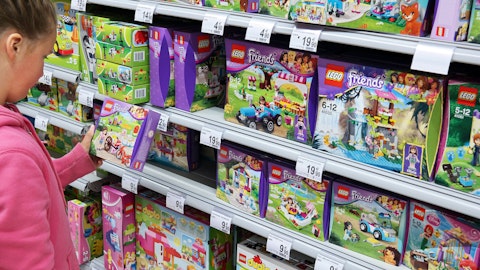Now, it’s funny first half, right, last such a broad category. These retailers, when they have what’s called a planogram and when you go in to sell them your product, they say, okay, I’m in. Let’s do it. This is great. And it’s kind of like a void. It’s like, okay, how do we go from here to there. And they say stand by, right? And they work €“ they essentially work you into the planogram over time. And many times, that’s 9 months to 12 months out. So don’t miss that too, it’s important. And so Ikigai and POOPH have to deal with that, as do we. That’s just the way it is. The good news is that, as it gets ceded, and as we move the product through as Ikigai really supports the market and move that product through those channels, you get a seat and you get to stay there for a long time.
So that’s what they’re after. So €“ the answer is, we’re seeing it already. I should probably just start with that one. How’s that? Right?
Brian Loper: Very good
Dennis Calvert: Yes.
Brian Loper: All right. Last question here. We don’t want to end on a low note, but if you just shine some perspective here, what effect do you think an upcoming recession environment will have on the company?
Dennis Calvert: That’s a good question. We all €“ everybody worries about that a bit, right? I mean, just the nature of the beast right now and the financial markets have just been so unpredictable. It makes it hard. I think two things are really important. One is that, the pet industry has proven itself largely recession-resistant. You’re just — what do you do for your pet. You treat them like your baby, that’s the answer. And that’s a strong market to be in, okay? And then the other market, right, remediation of a contaminant that links to cancer and birth defects. I don’t give a flip how much recession we got. That’s not going anywhere. So I think, the two main drivers in our portfolio have a resistance to that pressure.
And that’s good news. We’re going to do just fine, and we’re busy. And — so I think, it bodes well. Now the other implications are supply chain, of course, inflation, of course, and capital markets, of course, right? And so, we have always believed — and as the technology signed their adoption with our business model and it was a business model that’s prove up, get early market adoption, make the deal. As we make the deal and we watch that leverage occur for national and international expansion, especially in things like PFAS as that really finds its way. That — those issues are just less and less important, especially when you look at the marginal cash flow for things like POOPH. That product could carry the whole company, and we could be out of the capital raising business before you know it.
I mean really, if I look at it and I say, yes, that’s very doable. And we knew that when we started. And now we’ve got evidence to point to it, right? Now you can look at the number, look at the margin, look at the cash flow and say, what if that number was double, what if that number was triple. Why is that so far fetch? I mean, my goodness, you’ve got three national retailers just launching. We’re wholesaling. We’re not at risk on the retail. Now, we went itchy, got to make a bunch of money. Listen, they got to pay their bills just like everybody else. And that’s the thing that you have to really focus on as supply chain partner. Everybody’s got to win. Walmart’s got to win. They got to make money, right? So understanding that, right, understanding that, positioning a largely resistant to recession industry like PFAS through a national channel where there’s a win-win for all the participants, that’s a winner.





